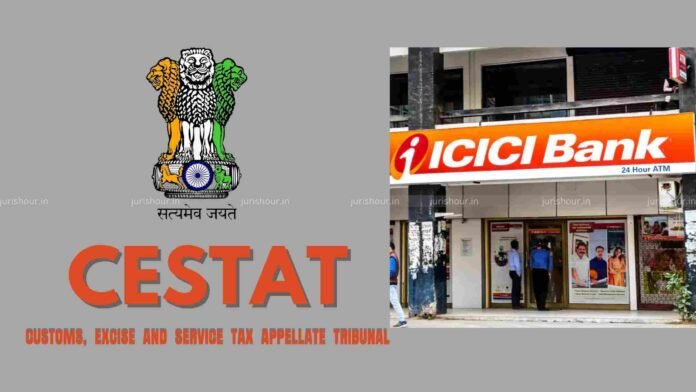The Customs, Excise & Service Tax Appellate Tribunal (CESTAT), Mumbai, has set aside multiple service tax demands raised on ICICI Bank Ltd. for alleged liability under the Reverse Charge Mechanism (RCM) on foreign bank charges related to export and import transactions.
The bench of S.K. Mohanty (Judicial Member) and M.M. Parthiban (Technical Member) has observed that Indian banks are not recipients of services rendered by foreign banks in cross-border trade settlements and hence, are not liable to pay service tax on such charges.
The proceedings stemmed from three show cause notices issued to ICICI Bank covering the periods July 2012 to June 2017, alleging non-payment of service tax on charges deducted by foreign banks while processing export and import remittances. The department argued that since the foreign banks had provided financial services to ICICI Bank in India, the latter was liable to discharge tax under Notification No. 30/2012-Service Tax, read with Section 68 of the Finance Act, 1994.
The adjudicating authorities had confirmed demands along with interest and penalties, treating ICICI Bank as a recipient of services provided by overseas banks.
The core question before the Tribunal was whether Indian banks, acting as advising or issuing banks in international trade transactions, are to be treated as recipients of service from foreign banks and therefore liable to pay service tax under RCM on foreign bank charges deducted abroad.
The ICICI bank, contended that it merely acts as an intermediary facilitating export and import payments on behalf of customers. No services are received by the Indian bank from the foreign bank, and there is no consideration flowing from the Indian bank to the foreign counterpart. The charges deducted by foreign banks are borne by the exporters or importers, not by ICICI Bank.
The bank argued that international banking protocols such as UCP-600 and URC-522 issued by the International Chamber of Commerce merely regulate inter-bank communication and do not create a service relationship between foreign and Indian banks.
The department contended that the services rendered by foreign banks in processing export and import documents were consumed in India by the Indian banks, and hence, ICICI Bank was liable under RCM. The department relied on a Trade Notice dated February 10, 2014, issued by the Chief Commissioner, Mumbai, clarifying that Indian banks should discharge tax on such foreign bank charges.
The Tribunal held that the Indian banks are not the recipients of any service from foreign banks in export/import transactions and hence, no liability arises under Reverse Charge Mechanism.”
The bench emphasized that the consideration for service must flow from the service recipient to the service provider. Since ICICI Bank had not paid any amount to the foreign banks, it could not be treated as a service recipient.
Quoting the Supreme Court’s decision in Bhayana Builders Pvt. Ltd. v. CST [2018 (10) GSTL 118 (SC)], the Tribunal reiterated that, “Service tax can only be levied on the value of services actually rendered for consideration received by the service provider. Any amount not forming part of such consideration cannot be taxed.”
The Tribunal noted that in international trade, the importer or exporter bears the foreign bank’s charges, and the Indian bank merely acts as a facilitator. Therefore, the liability cannot be shifted to the Indian bank.
The Tribunal concluded that ICICI Bank was not the recipient of service from foreign banks. The foreign bank charges deducted abroad do not attract service tax under RCM. The orders confirming demand, interest, and penalty were unsustainable in law.
Case Details
Case Title: ICICI Bank Limited Versus Commissioner of Service Tax – I
Case No.: Service Tax Appeal No. 85423 of 2017
Date: 23.10.2025
Counsel For Appellant: V. Sridharan, Sr. Advocate
Counsel For Respondent: Manish Mohan, Commissioner
Read More: BREAKING : CJI Gavai’s Recommends Justice Surya Kant To Become 53rd Chief Justice of India

